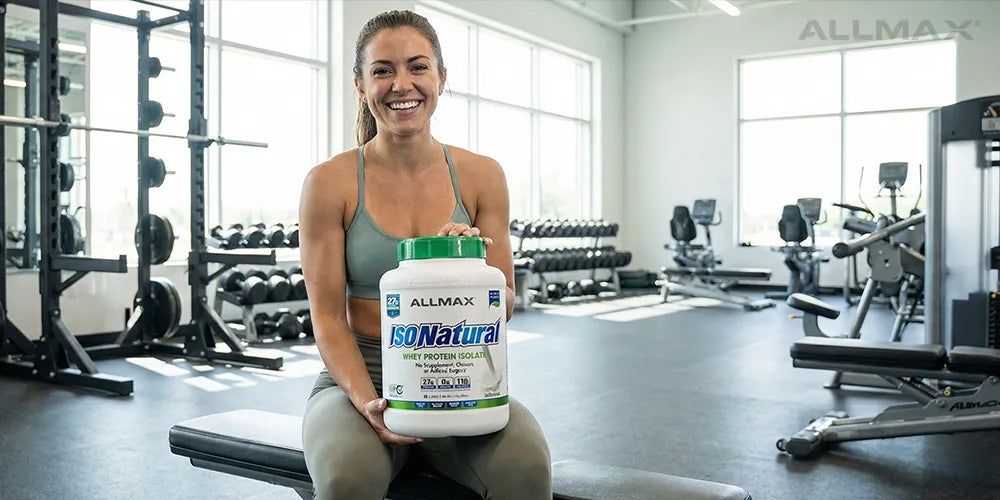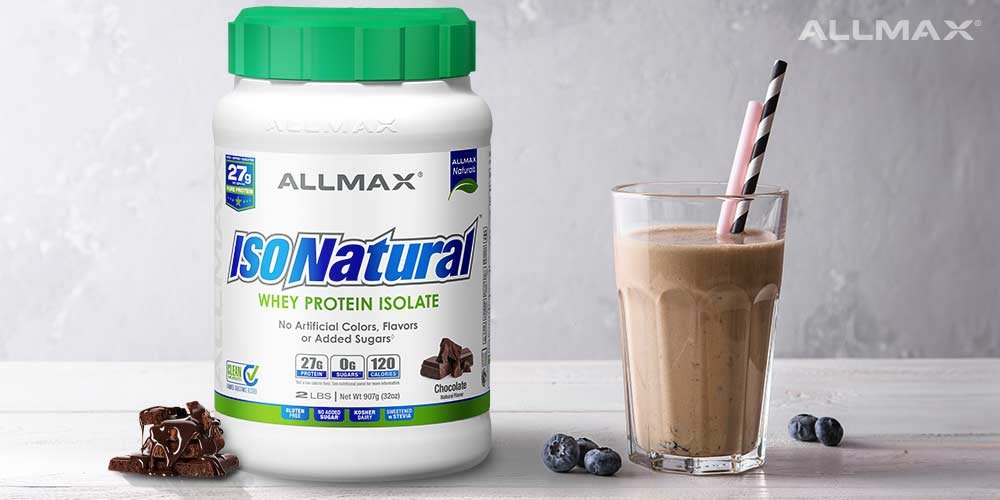Matcha vs. Coffee: The Energy Dilemma for Athletes
In gyms, locker rooms, and training centers across the United States, one question is constant: What’s the best fuel for energy—coffee or matcha?
Caffeine is part of nearly every athlete’s daily routine. But not all caffeine sources are created equal. While coffee provides an immediate jolt, it often brings a mid-day crash, dehydration, and increased heart rate. Matcha green tea, on the other hand, delivers steady, sustained energy—without the side effects.
And when combined with Allmax CytoGreens, matcha’s clean energy compounds synergize with Cytozymes and plant-based nutrients to enhance focus, stamina, and recovery.
Understanding Matcha: Nature’s Clean Energy Source
Matcha isn’t just another tea—it’s a finely ground powder made from shade-grown Japanese green tea leaves. Unlike steeped tea, where you discard the leaves, matcha allows you to consume the entire leaf, absorbing all its nutrients and antioxidants.
This unique composition gives matcha its unmatched benefits:
- Natural caffeine (70 mg per serving) for focus and alertness
- L-theanine, an amino acid that promotes calm mental clarity
- EGCG (epigallocatechin gallate), a powerful antioxidant that boosts metabolism and fat oxidation
- Chlorophyll, which aids detoxification and cell regeneration
Unlike coffee, which stimulates the nervous system quickly and harshly, matcha provides a balanced, time-released energy that lasts for hours.
See also: The Science Behind Cytozymes: Faster Nutrient Absorption for Athletes
Coffee: Fast Energy, Faster Crash
Coffee remains a staple for millions, but from a physiological perspective, it’s not always ideal for athletes. While it stimulates the central nervous system rapidly, it also triggers cortisol (the stress hormone) and depletes electrolytes through increased urination.
High doses of coffee can cause:
- Jitters and anxiety
- Dehydration and heart rate spikes
- Energy crashes 3–4 hours post-consumption
For endurance athletes, this can compromise hydration balance and muscle function—especially during long workouts or competitions. Matcha’s combination of caffeine and L-theanine offers smoother, more sustainable energy release.
Matcha’s Biochemical Edge: The L-Theanine Effect
The secret behind matcha’s calm yet focused energy lies in L-theanine, an amino acid almost unique to green tea. L-theanine modulates alpha brain waves, which are associated with relaxed focus—similar to meditation.
When combined with caffeine, L-theanine:
- Reduces anxiety and jitteriness
- Extends caffeine’s half-life
- Enhances focus and reaction time
A study by Bryan Raudenbush (Appalachian State University) found that participants who consumed caffeine and L-theanine experienced improved alertness and reduced mental fatigue compared to those who consumed caffeine alone.
This is why athletes using Allmax CytoGreens, which includes matcha green tea in its formula, experience focused energy without the crash associated with traditional caffeine.
Antioxidants and Recovery
Beyond energy, matcha is a recovery powerhouse. It contains up to 137 times more antioxidants than regular green tea (Journal of Chromatography A, 2003). These antioxidants help neutralize free radicals produced during intense training, reducing muscle fatigue and inflammation.
EGCG, the most abundant catechin in matcha, supports:
- Fat metabolism and energy utilization
- Cellular protection against oxidative stress
- Improved vascular health and oxygen delivery to muscles
When paired with the Cytozyme Complex in Allmax CytoGreens, EGCG absorption improves—making it even more bioavailable for athletic performance.
“Green tea catechins enhance exercise endurance by promoting lipid oxidation.”
Matcha + Allmax CytoGreens: The Synergy
Matcha provides natural, slow-release energy, while CytoGreens amplifies its bioavailability and recovery potential. Together, they form a complete athletic performance stack for U.S. consumers seeking cleaner alternatives to stimulants.
Here’s what the synergy delivers:
- Sustained Energy: Matcha’s caffeine + L-theanine combination reduces crash.
- Enhanced Absorption: Cytozymes ensure matcha antioxidants are effectively utilized.
- Improved Recovery: Spirulina and chlorella add amino acids and chlorophyll for faster repair.
- Gut Support: Probiotic greens promote digestion and nutrient assimilation.
- No Artificial Fillers: CytoGreens is a gluten-free, vegan-friendly green superfood powder made for performance athletes.
Learn more about the nutrient synergy behind this system: CytoGreens vs. Traditional Greens: Key Differences for Active People
Matcha for Weight Management and Endurance
For many U.S. athletes, maintaining lean muscle and endurance is a year-round challenge. Matcha supports both goals through:
- Thermogenesis: EGCG enhances calorie burn and fat oxidation, even at rest.
- Metabolic Regulation: L-theanine balances adrenaline and cortisol response.
- Steady Energy Supply: Supports long-distance running, cycling, or high-intensity workouts.
A 2018 study published in Frontiers in Physiology concluded that green tea extract preserves muscle performance and delays fatigue in endurance athletes.
This is one reason Allmax CytoGreens, with matcha as a key ingredient, is favored by performance-driven individuals across the U.S. fitness community.
Comparing Matcha vs. Coffee for Athletes
Let’s look at how matcha stacks up against traditional coffee in performance contexts:
- Energy Curve: Matcha releases caffeine gradually (no crash), coffee peaks fast and drops sharply.
- Focus: Matcha promotes calm focus, while coffee may cause overstimulation.
- Hydration: Matcha hydrates; coffee is mildly dehydrating.
- Acidity: Matcha is gentle on the stomach; coffee can irritate the gut.
- Nutrient Synergy: Matcha contains antioxidants and chlorophyll; coffee does not.
In short, matcha’s energy is smoother, longer-lasting, and cleaner, making it the superior choice for athletes who need sustainable focus and power.
How to Use Matcha with Allmax CytoGreens
Morning Pre-Workout:
Blend 1 scoop Allmax CytoGreens with 1 tsp matcha powder, a banana, and water for clean pre-training energy.
Afternoon Energy Boost:
Mix a scoop of CytoGreens into chilled almond milk and ice with matcha for a light, refreshing, antioxidant-packed drink.
Post-Workout Recovery:
Add CytoGreens and matcha to a protein smoothie for enhanced recovery and digestion.
Try more formulations here: Greens Powder Smoothie Recipes for Pre and Post-Workout
Matcha’s Role in Recovery and Anti-Inflammation
Intense physical activity causes oxidative stress, inflammation, and muscle micro-tears. Matcha’s EGCG and polyphenols counteract this by:
- Reducing inflammation markers (IL-6 and TNF-α)
- Supporting mitochondrial recovery
- Improving blood flow to muscles
These benefits are amplified when matcha is absorbed efficiently—something Cytozymes in CytoGreens make possible.

Why Athletes are switching to Matcha-Based Greens
The U.S. fitness community has seen a significant shift from coffee-based pre-workouts to plant-based energizers. The reasons are clear:
- Demand for clean energy without chemicals or synthetic caffeine
- Growing preference for gluten-free, vegan-friendly supplements
- Focus on sustainable, anti-inflammatory performance nutrition
Allmax CytoGreens perfectly aligns with these trends—delivering a green superfood powder powered by matcha green tea, spirulina, chlorella, and probiotic greens, formulated specifically for U.S. athletes and gym-goers.
Frequently Asked Questions
Does matcha have less caffeine than coffee?
Yes. Matcha provides about 70 mg per serving—enough for alertness without overstimulation or energy crashes.
Is matcha better for endurance training?
Absolutely. Matcha’s combination of caffeine and L-theanine supports focus, stamina, and fat oxidation during long workouts.
How does Allmax CytoGreens enhance matcha’s benefits?
The Cytozyme enzyme complex increases nutrient absorption and bioavailability, maximizing matcha’s antioxidants and amino acids.
Can matcha replace my morning coffee?
For most athletes, yes. Matcha delivers smoother, more consistent energy and supports hydration—making it ideal for training days.
References
- Bryan Raudenbush et al., “Effects of L-theanine and Caffeine on Cognition,” PubMed
- Weiss DJ, Anderton CR, “Determination of catechins in matcha green tea,” Journal of Chromatography A (2003)
- Frontiers in Physiology: “Green Tea Extract Preserves Neuromuscular Activation,” 2018
- Nutrition Journal: “Matcha Supports Resistance Training-Induced Adaptation,” 2023


